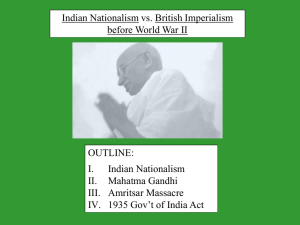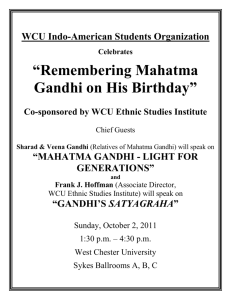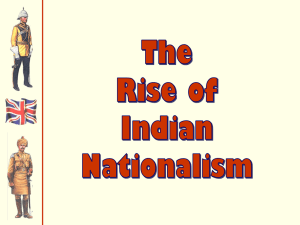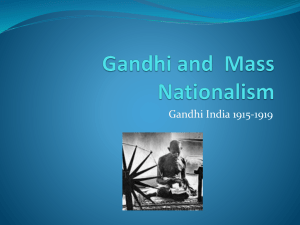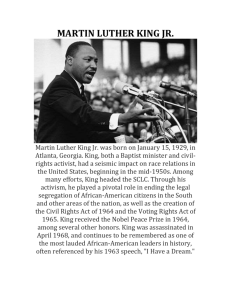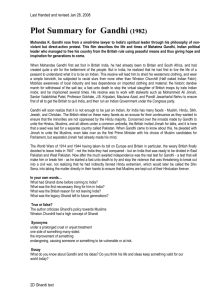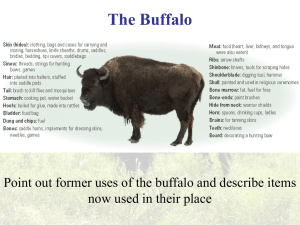Mahatma Gandhi as a Writer, Editor & Journalist
advertisement
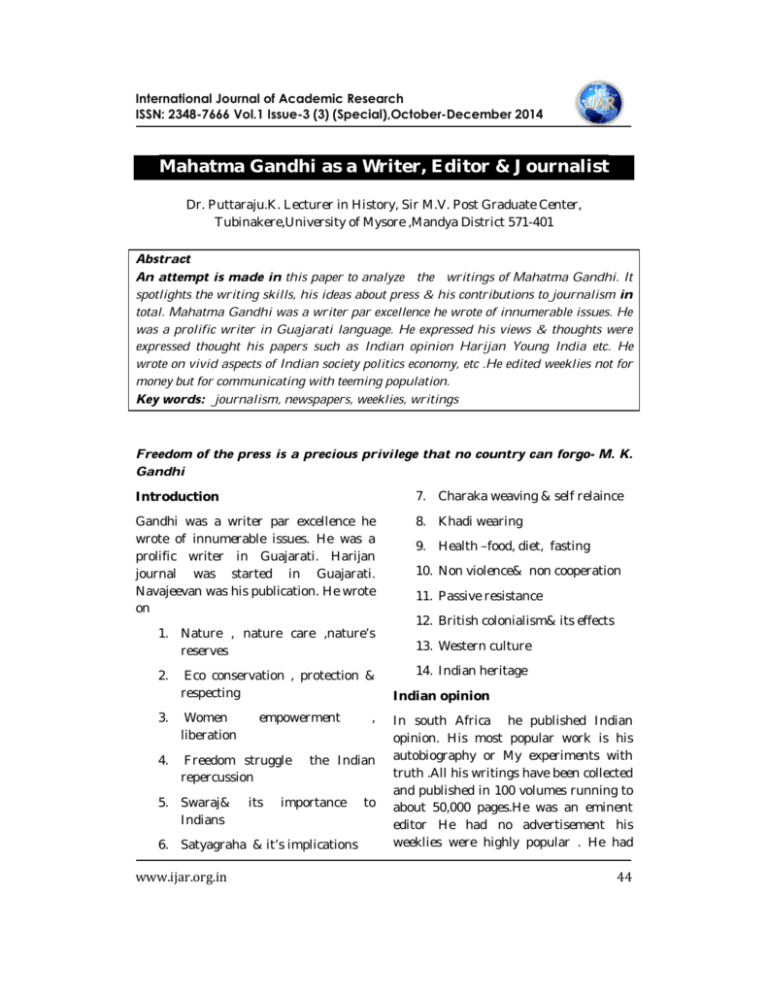
International Journal of Academic Research ISSN: 2348-7666 Vol.1 Issue-3 (3) (Special),October-December 2014 Mahatma Gandhi as a Writer, Editor & Journalist Dr. Puttaraju.K. Lecturer in History, Sir M.V. Post Graduate Center, Tubinakere,University of Mysore ,Mandya District 571-401 Introduction 7. Charaka weaving & self relaince Gandhi was a writer par excellence he wrote of innumerable issues. He was a prolific writer in Guajarati. Harijan journal was started in Guajarati. Navajeevan was his publication. He wrote on 8. Khadi wearing 1. Nature , nature care ,nature’s reserves 2. Eco conservation , protection & respecting 3. Women liberation 4. Freedom struggle repercussion 5. Swaraj& Indians empowerment its the Indian importance 6. Satyagraha & it’s implications www.ijar.org.in , to 9. Health –food, diet, fasting 10. Non violence& non cooperation 11. Passive resistance 12. British colonialism& its effects 13. Western culture 14. Indian heritage Indian opinion In south Africa he published Indian opinion. His most popular work is his autobiography or My experiments with truth .All his writings have been collected and published in 100 volumes running to about 50,000 pages.He was an eminent editor He had no advertisement his weeklies were highly popular . He had 44 International Journal of Academic Research ISSN: 2348-7666 Vol.1 Issue-3 (3) (Special),October-December 2014 gained considerable experience in South Africa, where he had taken over in1904 the editorship of the 'Indian Opinion' and published it in English, Tamil and Gujarati, sometimes running the press himself. He wanted to serve public through newspapers he did not make newspaper a place for earning money or dishonor political administrators. Objectives According to him the paper should have 3 objectives 1. Understand the popular feeling giving expression to it arousing desires fearlessly exposing the popular defects. He said in his autobiography: "The sole aim of journalism should be service. The newspaper is a great power, but just as an unchained torrent of water submerges whole countryside and devastates crops, even so an uncontrolled pen serves but to destroy. If the control is from without, it proves more poisonous than want of control. It can be profitable only when exercised from within. If this line of reasoning is correct, how many journals of the world would stand the test? But who would stop those that are useless? And who should be the judge? The useful and the useless must, like good and evil go on together, and man must make his choice. Gandhian Motto of Writing 1. For brotherhood amongst differing religions , castes , sects groups and ethnicities, www.ijar.org.in 2. For an end to untouchability and caste discrimination, 3. For the economic self-sufficiency of the nation, promising self reliance in each village called as GramaSwaraj 4. For the alleviation of poverty, supporting the helpless people 5. For the liberation of women through empowerment 6. For Swaraj the independence of India from British colonial domination Gandhian’ JOURNALS He was associated with six journals Indian opinion. Young India, Navjeevan, Harijanbandhu, Harijan, &Harijansewak 1. His first paper was Indian opinion This was started in South Africa . He wanted to mobilize public opinion against apartheid rules in South Africa. 2. He used newspapers to publish his opinions later he started giving interviews in appears he wrote letters to editors 3. But the political campaign which he was having fell short of his expectation &hence he thought of starting his own paper 4. Indian opinion was thus started in 1903. It was a weekly newsletter Indian community in South Africa was made aware of the problems of Indian laborers & civilians through this paper. 5. It was not only a newspaper it served as a medium of educating masses. He 45 International Journal of Academic Research ISSN: 2348-7666 Vol.1 Issue-3 (3) (Special),October-December 2014 wrote on education sanitation cleanliness, self discipline, & good citizenship.(Gupta. V.S. -Mahatma Gandhi and Mass Media- Bombay Sarvodayamandal& Gandhi research foundation , Bombay ) 6. In his biography, My Experiments with Truth: 'Indian Opinion... was a part of my life. Week after week I poured out my soul in its columns and expounded the principles and practice of Satyagraha as I understood it. During 10 years that is until 1914 accepting the intervals of my enforced rest in prison there was hardly an issue of 'Indian Opinion' without an article from me. I cannot recall a word in these articles set down without thought or deliberation or word of conscious exaggeration, or anything merely to please. Indeed the journal became for me training in self restraint and for friends a medium through which to keep in touch with my thoughts." 7. He was of the opinion, 'Newspapers are meant primarily to educate the people. They make the latter familiar with contemporary history. This is a work of no mean responsibility. It is a fact, however, that readers cannot always trust newspapers. Often facts are found to be quite the opposite of what has been reported. If newspapers realized that it was their duty to educate the people, they could not but wait to check a report before publishing it. It is true that often they have to work under difficult conditions. They have to sift the true www.ijar.org.in from the false in a short time and can only guess at the truth. Even then, I am of the opinion that it is better not to publish a report at all if it has not been found possible to verify it.' 8. Indian opinion became a great medium of his political struggle in South Africa. It aroused people to think of their rights 9. He used paper to educate masses. He thought education would give them the power to reason. 10. He believed that the sole aim of journalism should be to serve people, serve country & sacrifice everything for the service of the nation. In 'Young India' Gandhi once gave a glimpse of the exacting code he had set up for himself. "To be true to my faith, I may not write in anger or malice. I may not write idly. I may not write merely to excite passion. The reader can have no idea of the restraint I have to exercise from week to week in the choice of topics and my vocabulary. It is training for me. It enables me to peek into myself and to make discoveries of my weaknesses. Often my vanity dictates a smart expression or my anger a harsh adjective. It is a terrible ordeal but a fine exercise to remove these weeds." (Gupta. V.S. Mahatma Gandhi and Mass MediaBombay Sarvodayamandal& Gandhi research foundation , Bombay ) Young India This paper was heralded as the voice of Indian youth. He wanted Indian youth to understand the sacrifices their fathers & 46 International Journal of Academic Research ISSN: 2348-7666 Vol.1 Issue-3 (3) (Special),October-December 2014 fore fathers have been putting in the stream on freedom.It was a weekly paper between 1919-1932 .He used to spread his unique ideology and thoughts regarding the use of in organizing movements and to urge readers to consider, organize, and plan for India's eventual independence from Britain. He wrote articles on Khadi inception & made it clear that only self reliance through Khadi& charkha could alleviate Indian masses out of poverty. Harijan 1. This paper was announced in 1933 by Gandhi as in instrument of providing social justice to the underprivileged untouchable class of people. These people were left out of the mainstream of Indian society & they were considered as outcastes in India He proved the people that all are equals & all are Indians. It focused on socio economic problems. (Gupta. V.S. -Mahatma Gandhi and Mass Media- Bombay Sarvodayamandal& Gandhi research foundation , Bombay) Impact 1. The society awakened itself towards basic needs such as literacy, basic education , hygiene & health. 2. The writings of Gandhi & his daily practices inspired crores of people to identify themselves with his personality 3. The organizations for Harijan welfare were set up in many places This economic fallout drive motivated the www.ijar.org.in formation of community-based social welfare organisations to help those within the community to cope up with their new economic situation 4. Mahatma Gandhi wrote in young India that charkha is the symbol of the nation’s prosperity & therefore freedom. It is the symbol of not commercial war but commercial peace. ( Mahatma Gandhi in Young India 08-12-1921). Hence Khadi became a tool in the hands of millions of people awakening them towards Indian freedom struggle. 5. A bond of unity between the classes and masses by bridging the gap with a common brotherhood was geared up through his articles. 6. The values of spirituality brotherhood goodwill and self-help was spread through his writings 7. Women of the villages who had no means of earning a respectable livelihood in villages became great pillars of support in Indian freedom struggle motivated by his writings. 8. The values of morality spirituality & simplicity were spread through this writings. 9. All over India people started numerous associations to connect themselves with the social & community orientated works. 10. Countless people started local newspapers in local languages inspire by Gandhi to reach out to people . 47 International Journal of Academic Research ISSN: 2348-7666 Vol.1 Issue-3 (3) (Special),October-December 2014 11. Journalism became a great & honored occupation promoting patriotism & service to nation. 2. Dalton, Dennis, ed. (19960selected works of mahatma gandhi. Hackett Publishing. 12. Gandhian ideals of non co-operation. Harijanupliftment. Satygraha. Swadeshi, Shiksha ,GramaSwarajetc became popular vehicles on Indian freedom struggle through his writings. 3. Gandhi, M. K.; Fischer, Louis (2002). Louis Fischer, ed. The Essential Gandhi: An Anthology of His Writings on His Life, Work and Ideas. Vintage Books. . Conclusion Thus Mahatma Gandhi & his writing kept the Indian spirit to freedom at a high level his writings educated inspired & motivated people across the world to indulge in service. The writings itself became a public profession which numerous people found a worthy occupation to engage in. 4. Gandhi, Mohandas Karamchand (1928). Satyagraha in South Africa (in Gujarati) (1 ed.). Ahmedabad: Navajivan Publishing House. "Translated by Valji G. Desai" 5. Gupta. V.S. -Mahatma Gandhi and Mass MediaBombay Sarvodayamandal& Gandhi research foundation , Bombay References 1. Andrews, C. F. (2008) [1930]. The teachings of mahatma -Mahatma Gandhi's Ideas Including Selections from His Writings. Pier ides Press. . www.ijar.org.in 48
